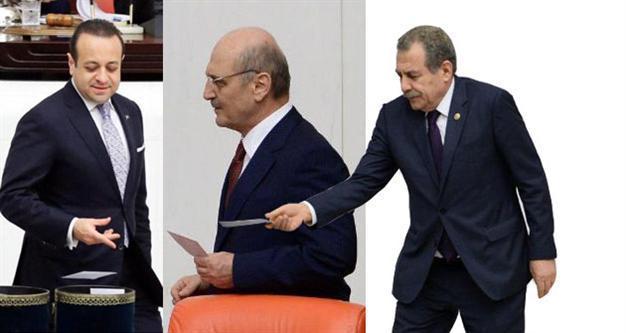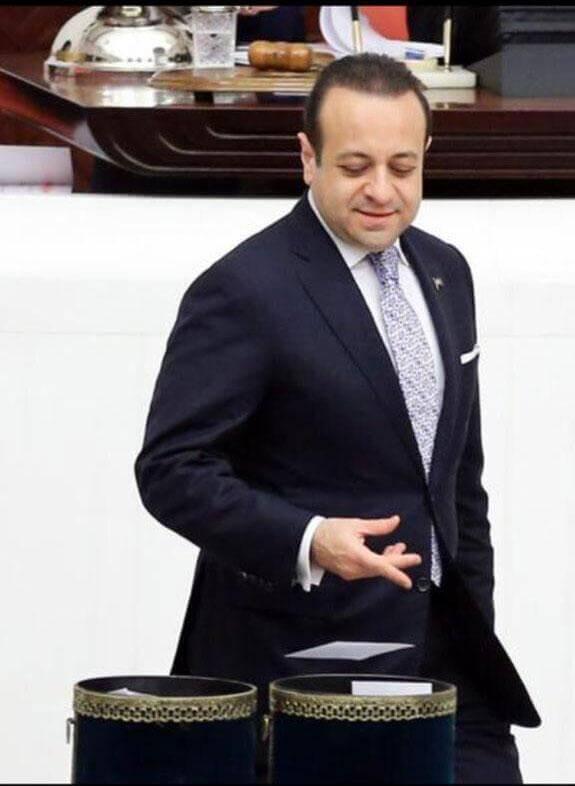Parliament acquits four ex-ministers on corruption, but vote stirs ruling AKP
ANKARA

(L-R) Egemen Bağış, Erdoğan Bayraktar and Muammer Güler are seen in this photo combination while casting their votes in parliament late on Jan 20. Zafer Çağlayan, the fourth ex-minister who was accused of corruption, was not present at the General Assembly because of a funeral for his mother.
Turkey's parliament has acquitted four ex-ministers who faced graft charges, thanks to the votes of the ruling Justice and Development Party (AKP) deputies. A number of AKP deputies, however, broke party lines, infuriating the leadership while surprising most observers.Some 264 deputies voted against sending former Economy Minister Zafer Çağlayan to the Supreme Council in order to be tried on charges of bribery and corruption, while 242 deputies cast yay votes during a secret poll in a General Assembly session on Jan. 20. Seven deputies abstained from voting, three votes were deemed invalid while another one was empty.
Çağlayan, who was not present at the Parliament during the vote due to a funeral ceremony for his mother, was one of four implicated ex-ministers with former EU Minister Egemen Bağış, former Enrivonment and Urban Planning Minister Erdoğan Bayraktar and former Interior Minister Muammer Güler.
In the second vote of the night, 513 deputies cast votes. Some 258 deputies voted against sending Güler to the top court, while 241 voted for his transfer. Six deputies abstained, four votes were invalid while another four were empty.
The third vote, which was conducted only after midnight due to the ensuing debate on parliamentary rules, was on the case of Bağış. Out of 517 ballots cast, 255 votes were against sending Bağış to the court and 245 were for it. Seven deputies abstained and 10 votes were either invalid or empty.
Some 515 deputies cast their votes in the fourth and last voting session on Bayraktar. While 219 of them voted to send Bayraktar to the court, 288 opposed it. Three deputies abstained, while a total of five votes were either invalid or empty.
Opposition cries foul
The meetings offered the opposition leaders not only the chance to deliver messages to their grassroots, but also to AKP deputies whose decision was set to be decisive on whether to send former ministers to the Supreme Council in order to be tried on charges of bribery and corruption.
“This parliament is the parliament which conducted the National War of Independence. This parliament cannot accept dirt. Let’s not be contaminated with dirt here. We all have a conscientious and moral responsibility. We have the responsibility in the face of our children, our country and our homeland. We are the ones who will render the state prestigious – it is the votes that we will cast,” CHP leader Kemal Kılıçdaroğlu said.
“I’m calling on all AKP deputies except nine persons at the commission,” Kılıçdaroğlu said, referring to AKP members of a corruption inquiry panel which had previously concluded that there was no reason to send the former ministers to the Supreme Council because “there is no evidence for sufficient doubt.”
“Ask your conscience, ask your morality and ask your faith,” he added. “What makes a society respectable is how it goes after corruption and bribery. I want the parliament to fulfill its duty with integrity. If the parliament fulfills is duty, you shall have no doubt that Turkey’s reputation will grow in the entire world, but not only for people in Turkey,” he said. “The entire world will say: ‘Yes, There is a TBMM [The Grand National Assembly of Turkey] in Turkey, and it is protecting the rights of the society until the end.”
Bayraktar, however, said he wanted to talk about the allegations about him as part of the corruption and graft probe but that his friends warned him not to do so.
“I want to talk, I still want to. But my close friends and fellows said it would be better if I don’t do so. Therefore, I will not talk. I state these because I love you. You should also love me – I need some love,” he told reporters before he entered the General Assembly.
MHP leader Devlet Bahçeli called on lawmakers from the AKP to “make a choice between burglary and law,” while underlining that the MHP’s votes were certain.
However, the ministers could only be sent to the Supreme Council depending on the votes of “scrupulous” ruling AKP deputies, Bahçeli added.
“AKP lawmakers will take a vital test in front of history and the nation,” he said.
Many AKP deputies break party lines
In the 550-seat parliament, 18 deputies were absent during the first vote. Some 517 others, including the parliament speaker from the AKP, were present out of 535 deputies in total. The 15 vacant seats were either due to deaths or because of deputies who were elected as mayors in March 30, 2014, local elections.
At least 276 votes were required during the secret vote to send the four to the Supreme Council. Opposition parties and independent deputies currently hold 223 seats in the parliament. It meant that a minimum of 53 lawmakers from the AKP were needed to do likewise for the vote to pass.
In this case, only 19 AKP deputies might have voted in favor of sending Çağlayan to the court. Some analysts claimed that this number could be even higher than 50, all because of the assumption that all of the opposition deputies cast yay votes. There was a shift within opposition deputies as well, the analysts noted.
According to this calculation, the number of AKP deputies who broke party lines even increased in the votes for Gülen and Bağış. Bayraktar, on the other hand, was seen celebrating the result with his colleagues, as the voting session on him was the most successful one compared to the other three for the ruling party. Only 14 AKP deputies voted to send Bayraktar to the court.
Meanwhile, CHP chair Kemal Kılıçdaroğlu claimed that some 40 AKP deputies voted to send Çağlayan to the court. "I think it is important that some 40 deputies voted by listening to their hearts in spite of the pressure," he said.
Mahir Ünal, the AKP's parliamentary group chair, told journalists after the Çağlayan vote that "apparently there are 38 missing votes," referring to the ruling party deputies that cast their secret votes breaking the party line.
Şamil Tayyar, an AKP deputy, on the other hand, referred to a "network of treason among us" during a television program late Jan. 20. "There are 38 missing deputies. It is more than expected," he said, arguing that those who broke the party lines "would be identified in 48 hours as the time for a cleansing in the party has come."
Objections about method
Opposition parties also claimed that several aspects of the votes violated parliamentary rules. The CHP's parliamentary group chair Akif Hamzaçebi said in a speech addressing the deputies that the votes did not mean that the controversial parliamentary commission report on the case was adopted by the General Assembly. Voting through proxies during secret vote was also slammed by the opposition.
Having departed from Ankara for an official visit to London late on Jan. 19, Prime Minister Ahmet Davutoğlu was absent during the key session. A proxy was set to cast Davutoğlu’s vote, while the same would be the case for some members of the cabinet who were also absent, such as Deputy Prime Minister Ali Babacan and Finance Minister Mehmet Şimşek who accompanied the prime minister in London.
HDP co-leader Selahattin Demirtaş urged ruling party lawmakers to preserve their dignity while casting their votes, while he pledged to do the party’s best to send the four to the top court.
“Particularly, those AKP deputies who haven’t put their honor and self-respect in their wallets should cast a yay vote. If I were in those ministers’ shoes, I would cast a yay vote,” Demirtaş said.
Both Kılıçdaroğlu and Bahçeli also encouraged the former ministers to cast yay votes in order to prove their innocence.
Furthermore, Kılıçdaroğlu recalled how the founding leader of the now-dissolved Motherland Party (ANAP), then-Prime Minister and President Turgut Özal accused his own state minister, İsmail Özdağlar, of being involved in bribery and abuse of office and eventually sent him to the Supreme Council on May 15, 1985, with a vote of ANAP deputies.
Erdoğan's unbending stance
Most observers have been claiming in the past few days that the vote would almost surely be resulted in favor of the ex-ministers, considering the unbending stance of President Recep Tayyip Erdoğan and the Davutoğlu government, which insisted that the corruption allegations were part of a "coup plot" by the followers of U.S.-based Islamic cleric Fethullah Gülen inside the state bureaucracy, dubbed the "parallel structure."
Erdoğan's rift with his ally-turned-nemesis Gülen dramatically turned into a war after the corruption investigations in December 2013.
The smaller of two dossiers, the Dec. 25 investigation, was dropped by a newly-appointed prosecutor in September 2014. An allegedly Gülenist prosecutor called the president's son Bilal Erdoğan to testify, too, but the police did not comply with the order.
The larger of two dossiers in the graft investigations, on the other hand, was dropped by the new prosecutor in October 2014. Some 53 graft suspects including former ministers’ sons, the former manager of Halkbank, and a controversial Iranian-Azeri businessman were implicated in the Dec 17. investigation.

















